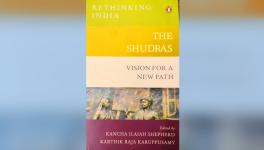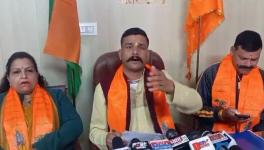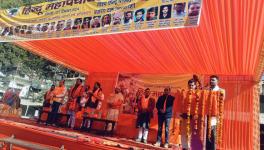Assembly Poll Results: Alongside Defeat, It’s Necessary to Analyse BJP's Victory Mechanism
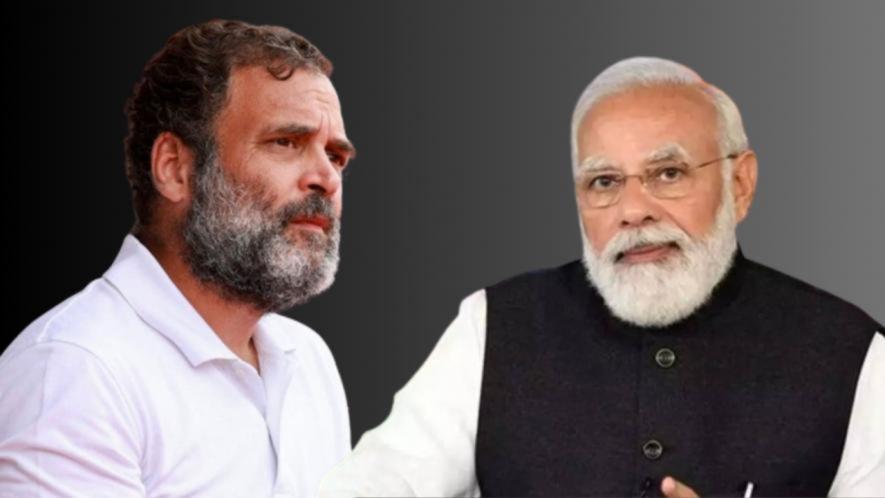
Elections teach us the basic lessons of democracy. The Assembly elections held in five states tell the story of a system that is dominant over the people. Out of these five states, the unexpected landslide victory of the Bharatiya Janata Party (BJP) in three big states of the Hindi belt -- Rajasthan, Madhya Pradesh, and Chhattisgarh – has had a direct impact on the future of the Opposition INDIA bloc. And, that impact has been very hard. The Congress had to postpone the meeting of the INDIA bloc called on December 6. This development should be recorded as the fourth victory for BJP and especially Prime Minister Narendra Modi. Congress is the nucleus of the INDIA bloc and the more intense the attack on Congress is from within and outside, the more beneficial it will be for BJP. This whole incident seems as if a script is being read.
The Assembly poll victory is attributed to the charisma of Prime Minister Modi and the blame for the defeat is being pinned on Congress leader Rahul Gandhi. With this, a successful move was made to blunt the edge of the Opposition and its alliance -- INDIA.
The entire focus has shifted to discuss what went wrong in the Congress and its leadership. With this, we can easily move toward making Indian democracy Opposition-free at the national level. There should be a discussion on the irregularities of Congress, but also the poll results need concrete analysis of the victory and an invisible system.
Democracy without opposition is a scary proposition, and if the country is moving in that direction, then it is very important to find and identify the reasons behind it. In his speech in the beginning of the winter session of Parliament after winning in three states, Prime Minister Modi said that the Opposition lost because it carried out “negative” campaigning. The reality is that BJP's campaign under the leadership of the Prime Minister in these three Hindi-speaking states was focused on communal polarisation (Kanhaiyalal's murder in Rajasthan), indecent remarks about Rahul Gandhi (‘Chief of fools, hang him’), etc. Add to this the speeches made by Assam Chief Minister Himanta Biswa Sarma and Uttar Pradesh Chief Minister Yogi Adityanath, it shows how communal hatred was propagated to polarise Hindu votes. But who will keep track of all this?
According to the Constitution of the country, the Election Commission (EC) should take action against the above speeches, which contributed to the spread of communal disharmony among the voters, which is an offence, but our EC has been seen as very kind toward hate mongers. The EC had problems with the word panauti, but not with words that directly spread communal hatred and target national leaders with hateful campaigns.
Bahujan Samaj Party (BSP) chief Mayawati's statement regarding BJP's victory in five states is noteworthy. She is usually seen making very limited but blunt comments. Mayawati termed these election results as “strange, one-sided, and difficult to digest.” She did not stop there, and further said in her statement posted on social media, that such a “mysterious victory” needed serious analysis/thinking and its solution.
Considering the entire atmosphere of the elections, it is very difficult for people to accept such a strange result. The atmosphere during the entire election was completely different, closely fought, and interesting, but the outcome is completely different, and completely one-sided. This is mysterious and requires serious thinking and solution.
1. देश के चार राज्यों में अभी हाल ही में हुए विधानसभा आमचुनाव के आए परिणाम एक पार्टी के पक्ष में एकतरफा होने से सभी लोगों का शंकित, अचंभित व चिन्तित होना स्वाभाविक, क्योंकि चुनाव के पूरे माहौल को देखते हुए ऐसा विचित्र परिणाम लोगों के गले के नीचे उतर पाना बहुत मुश्किल।
— Mayawati (@Mayawati) December 4, 2023
The point that Mayawati has raised is relevant and serious. It is serious because the future of Indian democracy is linked to it. If one sees this in the context of the election results of Chhattisgarh and Madhya Pradesh, then the “mystery” seems very deep. The occurrence of such an unseen wave in Madhya Pradesh, with the BJP getting 54 more seats than in the 2018 elections, certainly raises questions about the electoral system.
Similarly, if the results of Chhattisgarh – where no one was able to gauge the public mood –do not generate curiosity, then it would be surprising. A small piece of news about a meeting of RSS held in Bhopal after voting in Madhya Pradesh also says a lot. According to news reports, the Sangh's co-provincial campaigner Vimal Gupta noticed that the faces of most of the people present in the hall were looking disappointed. He sang the song from the film, Kal, Aaj Aur Kal released in 1971...
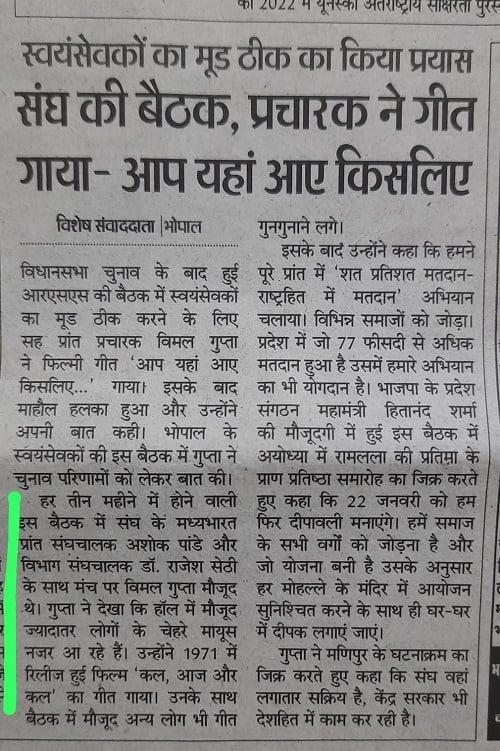
All such things and the questions being raised, in my opinion, point toward a big change, a systematic change, i.e. a change in the system, a structural change -- that is, the mechanism of winning elections in a democracy, which has in popular parlance been termed as the ‘Modi Magic.’ Winning elections by any means has become the ultimate goal.
The list of tools used for this is very long – from electoral bonds to the use of investigative agencies (ED, CBI) against political adversaries openly, and the EC’s role are some aspects that are working as invisible factors. In addition, there is a tendency to create an atmosphere of invincibility among the voters with regard to BJP (here it can also be read as Modiji). BJP will win in every situation, and where it cannot, it will sabotage whichever government is formed, and form a government with the help of turncoats by horse-trading or by using Central agencies.
Since 2014, the BJP's election system was of buying MLAs through horse trading and manipulations, shifting them to other states by chartered planes is fresh in the country’s memory, be it Goa or Maharashtra... But after the massive defeat in Karnataka, this system has changed its strategy.
Since the biggest focus is on the results of the three states of North India i.e. Rajasthan, Madhya Pradesh, and Chhattisgarh, which are very important in terms of the upcoming Lok Sabha elections, these should be discussed from a different lens. In these three states, the tribal parties won five seats but came third on 20 seats. They directly influenced the victory or defeat of 24 seats in these states. In all three states, 101 seats were tribal-dominated and ST-reserved. Of these, about 35 seats were dominated by the Bharat Adivasi Party (BAP), Gondwana Gantantra Party (GGP), and Bharatiya Tribal Party (BTP).
The tribal population in Chhattisgarh is 31%, Madhya Pradesh 12%, and 13.5% in Rajasthan. In Rajasthan, Congress's failure not to align with BAP has turned out to be a major strategic mistake and disaster. In Rajasthan, BAP contested a total of 27 seats, out of which 17 were tribal reserved, and won three of them. BJP won six and Congress just two. BAP has spoiled the game of Congress in all these belts. More or less, the situation is similar in Madhya Pradesh and Chhattisgarh.
Now you can relate to the ‘gratitude’ expressed for tribals in Prime Minister Narendra Modi's victory speech. He said Congress was wiped out from tribal-dominated areas in these three states and this was a lesson for the Congress.
Another lesson that national and state Congress leadership can learn from these election results is that they cannot win the electoral battle by becoming the B-party of BJP. Be it Kamal Nath in Madhya Pradesh or Bhupesh Baghel in Chhattisgarh, the way they conducted themselves and made strategies to win the elections by worshiping ‘babas’ and temples, they have got a befitting answer.
The victory of Congress in Telangana and the victory of the Zoram People's Movement in Mizoram show that the opposition can challenge the BJP's electoral system only by having a strong ground-level strategy that takes everyone along.
For now, Congress will have to think about new leadership and a sharp grassroots campaign. At the same time, all the parties involved in the INDIA bloc will have to understand that if they no longer remain together, they will not be able to save themselves.
(Translated from Hindi by Mahesh Kumar)
Get the latest reports & analysis with people's perspective on Protests, movements & deep analytical videos, discussions of the current affairs in your Telegram app. Subscribe to NewsClick's Telegram channel & get Real-Time updates on stories, as they get published on our website.














